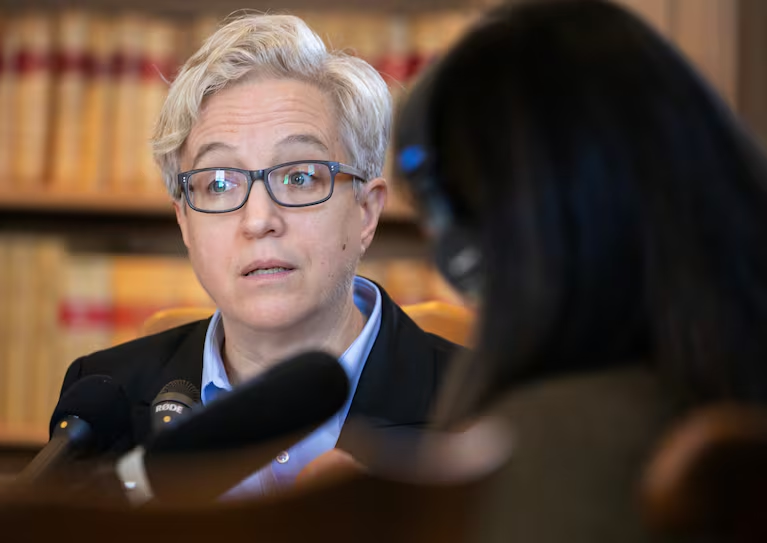As Oregon Governor Tina Kotek prepares to launch her re-election campaign, her political future appears both promising and precarious. While many predict she will secure another term, a growing number of Oregonians — including some of her supporters — remain uncertain whether she’s delivered on her ambitious agenda.
A Governor in the Spotlight
Just days before Kotek’s 59th birthday, former President Donald Trump announced the deployment of National Guard troops to Portland, calling the city “war-ravaged.” For Kotek, the move provided a powerful political contrast — a Republican president taking aggressive federal action against a Democratic stronghold.
Kotek, known for her calm but firm demeanor, seized the moment.
“The administration is being dishonest,” she said. “Deploying troops this way is a gross, un-American abuse of power.”
Also Read
Her response galvanized Oregon Democrats and reminded her base of the pragmatic leader who once dominated the state legislature. “She’s smart, strategic, and calm — this is her moment,” said Rep. Dacia Grayber (D-Portland).
High Expectations, Modest Results
Yet, despite flashes of leadership, Kotek’s record as governor remains divisive. After two and a half years in office, even allies struggle to name signature accomplishments.
“She was an excellent speaker of the House,” said one longtime business lobbyist, “but I haven’t seen that translate as governor.”
Much of the criticism stems from her struggles to move major initiatives — most notably, her failure to pass a long-term transportation funding package and the slow progress on her top three priorities: housing, education, and behavioral health.
The Housing Challenge
Housing was supposed to be Kotek’s defining issue. She set an ambitious goal to build 36,000 new housing units per year. But construction has actually declined, with just over 14,000 units added in 2024.
Critics blame regulatory red tape and Kotek’s earlier legislative support for rent control and zoning restrictions. Supporters counter that national trends — including high interest rates and a shortage of construction workers — have slowed progress nationwide.
“She’s laid the groundwork,” said Mary Kyle McCurdy of 1000 Friends of Oregon. “The foundation for more housing is there, but the results will take time.”
Education and Behavioral Health: Incremental Progress
Kotek has also focused heavily on Oregon’s struggling education system. She has championed reading reform, expanded summer learning programs, and given the state more authority to intervene in failing school districts.
Still, Oregon’s test scores remain among the lowest in the country, and chronic absenteeism continues to plague classrooms. “We have a clear set of wins that will set us up for future success,” Kotek insists, “but this takes time.”
In behavioral health, progress has been somewhat more tangible. The state has added treatment beds and secured new funding for mental health and addiction services. Chris Bouneff of the National Alliance on Mental Illness Oregon praised Kotek as “one of the few governors who’s actually taken meaningful steps.”
A Troubled Governor’s Office
Kotek’s tenure has also been marked by internal turmoil. In early 2024, she abruptly fired her chief of staff, Andrea Cooper. Two senior aides — Lindsey O’Brien and Abby Tibbs — resigned in protest, and others followed.
The exodus reportedly stemmed from concerns about First Lady Aimee Kotek Wilson’s growing influence in state affairs. Kotek downplayed the issue, calling her wife “an expert” and defending her involvement in behavioral health initiatives.
Still, insiders say the shakeup left lasting scars. “Who wants to join an office after that kind of fallout?” one Democratic consultant said. Many believe the administration lost valuable experience and political acumen in the process.
Leadership Under Fire
The staff departures coincided with what critics describe as a lack of visible leadership. When the legislature’s transportation plan collapsed earlier this year, Kotek appeared detached. “I was surprised,” she said. But many lawmakers and lobbyists weren’t convinced.
Her absence from a Labor Day weekend special session further fueled criticism. A photo circulated of Kotek shopping in Astoria during legislative hearings — a minor moment that symbolized, to detractors, a larger perception problem.
“I literally took an hour break to buy some bread,” she later said, brushing off the controversy.
Supporters See the Long Game
For Kotek’s allies, the governor’s deliberate pace reflects realism, not inaction. “When I ran for this office,” she said, “I promised to focus on long-term progress — not instant gratification.”
Indeed, many credit her for tackling Oregon’s most stubborn challenges, from homelessness to education inequities, even when solutions are slow and politically costly.
“She doesn’t avoid hard things,” said Matt Tschabold, Kotek’s housing director. “That’s why she’s in this job.”
Political Landscape: Advantage Kotek
Despite mixed reviews, Kotek’s path to re-election looks strong. A recent DHM Research poll found her approval rating at 44% — not stellar, but stable — with a recall campaign against her gaining little traction.
Republicans, meanwhile, face steep odds. The likely GOP frontrunner, Marion County Chair Danielle Bethell, is viewed as a capable local leader but may struggle statewide in a blue-leaning Oregon. Political experts doubt any Republican could overcome national polarization and Trump’s unpopularity in the state.
“It would take a very unique Republican to win statewide here,” said Portland State University’s Chris Shortell. “And even then, the odds are long.”
Looming Economic Pressures
Yet challenges lie ahead. Oregon faces an impending budget shortfall due to declining revenues and cuts in federal funding under Trump’s “One Big Beautiful Bill.” Democratic lawmakers are already warning of difficult cuts to services, jobs, and programs.
If Kotek struggled to deliver results during times of abundance, skeptics question how she’ll perform amid fiscal tightening. Still, the governor insists she’s ready. “We have talented lawmakers — maybe a little green, but talented,” she said. “We’re going to figure this out.”
Balancing Local Needs and National Tensions
Trump’s renewed clashes with Oregon have again thrust Kotek into the national spotlight. Her sharp criticism of federal agents’ actions in Portland has rallied Democrats but raised concerns she may be distracted from urgent state matters.
“Federal agents are instigating conflict with people who are lawfully protesting,” Kotek said recently. “We don’t agree with this kind of federal overreach.”
For now, that defiance appears to be uniting her base — at least temporarily.
What Comes Next
As she readies her re-election bid, Kotek faces a defining question: Can she convert her long-term vision into visible progress that voters feel in their daily lives?
Even her allies acknowledge the stakes. “This will be her last term,” said State Treasurer Elizabeth Steiner. “She won’t get another chance to tackle Oregon’s toughest issues. I hope she uses it.”
For Tina Kotek, the campaign ahead will test whether slow, steady leadership can still win in an age of impatience — and whether Oregonians will give her time to finish what she started.












